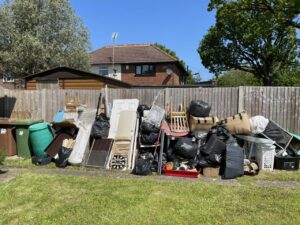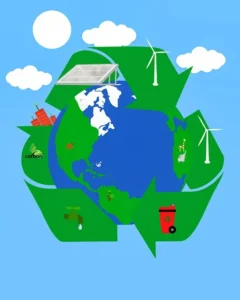As the world faces increasing environmental problems, cutting household waste is key to a greener tomorrow. Waste affects the environment and uses up natural resources and contributes to global warming and pollution. By adopting good waste management practices we can have a better future for our children.
This post will show you how to cut waste, focusing on food waste, organic waste and daily living.

1. Understanding Household Waste
Household waste refers to the waste generated by households, including food waste, plastic waste, paper waste, glass waste, and other types of waste. It is a significant contributor to the overall waste management problem, and understanding its composition and generation patterns is crucial for developing effective waste reduction and management strategies.
What is Household Waste?
Household waste encompasses all types of waste generated by households. This includes:
- Food waste: Fruit and vegetable peels, leftover food, and other organic waste.
- Plastic waste: Plastic bags, bottles, containers, and other plastic items.
- Paper waste: Newspapers, cardboard, paper towels, and other paper products.
- Glass waste: Glass bottles, jars, and other glass containers.
- Electronic waste: Electronic devices, batteries, and other electronic items.
- Hazardous waste: Batteries, fluorescent bulbs, and other hazardous materials.
Understanding the composition of household waste is essential for developing effective waste reduction and management strategies. By identifying the types of waste we generate, we can implement targeted measures to reduce, reuse, and recycle more effectively.
2. Assessing Your Current Waste Generation
Assessing your current waste generation is an essential step in developing a waste reduction and management plan. By understanding how much waste you generate and what types of waste you produce, you can identify areas for improvement and develop strategies to reduce your waste.
To assess your current waste generation, you can:
- Keep a waste diary: Record the types and amounts of waste you generate over a week or a month.
- Conduct a waste audit: Sort through your trash and recycling bins to identify the types and amounts of waste you generate.
- Use online tools: Utilize online tools and apps to track your waste generation and identify areas for improvement.
By assessing your current waste generation, you can identify opportunities to reduce your waste and develop a plan to achieve a more sustainable future.
3. Reduce, Reuse, Recycle
The reduce, reuse, recycle approach is the basis of waste reduction. By reducing waste production you minimize the amount of waste in the first place. Here’s how:
- Reduce: Choose products with minimal packaging, avoid single use plastics and choose sustainable materials.
- Reuse: Replace disposable items with reusable containers and cloth bags for shopping.
- Recycle: Find out what can be recycled in your area and segregate your recyclables like aluminium cans, paper and glass.
Improper waste management can lead to the contamination of soil, water, and air, posing severe environmental and health risks, including respiratory illnesses and ecosystem degradation.
These changes can add up to make a big difference.

4. Food Waste and Organic Waste
Did you know food waste makes up a big chunk of household waste? Managing your food scraps, veggie scraps and even coffee grounds can reduce waste production.
Compost Kitchen Scraps
Set up a compost bin at home to divert organic waste from landfills and turn it into nutrient-rich soil for your garden. This not only reduces greenhouse gases like methane but also supports healthier ecosystems. By turning organic waste into a resource, you’re contributing to environmental sustainability.
Support Local Farmers
Instead of wasting excess produce, consider donating or selling it to local farmers who can use it for feed or compost. This builds a circular economy and supports the community.
5. Cut Plastic Waste
Plastic waste is a major environmental problem as it takes decades to decompose and ends up in oceans and harming wildlife.
Here’s how to tackle the problem:
- Switch to reusable alternatives like cloth bags and refillable water bottles.
- Avoid plastic bags by choosing biodegradable or recycled materials.
- Choose products with minimal packaging and support brands that use sustainable materials.
Making these changes reduces our reliance on toxic plastics and helps the environment.
6. Handle Toxic Waste Properly
Items like electronic waste, old batteries and unused chemicals contain toxic substances and chemicals that can harm the environment and human health if not disposed properly.
Proper waste segregation is essential in handling toxic waste as it helps mitigate environmental and health hazards by minimizing the release of harmful pollutants, conserving natural resources, and promoting recycling efforts.
Proper Segregation
Segregate toxic waste from regular trash and handle properly. Many local councils and waste management services have dedicated collection points for electronic devices and chemical waste.
By managing waste properly you can reduce the environmental impact of waste.
7. Invest in Waste Management Practices
Practice sustainable waste disposal and you’ll be paving the way for a more sustainable future.
This means:
- Recycling: Join community initiatives to increase recycling rates.
- Composting: Compost kitchen scraps and turn waste into nutrient rich soil for your garden.
- Cleaning products: Choose eco friendly cleaning products that are biodegradable and packaged in recyclable materials.
These practices not only benefit the environment but also save money by reducing the need to purchase new materials.
These also save you money by reducing waste removal costs.
8. Go Zero Waste
Zero waste living might seem overwhelming but small changes can add up.
Focus on reducing waste to landfills and long term habits to achieve this:
- Replace disposable tea bags with reusable ones or opt for loose-leaf tea to reduce packaging waste.
- Buy in bulk to reduce waste and packaging consumption.
- Donate unwanted items like clothing or furniture to reduce unnecessary waste.
A zero waste approach creates a culture of conservation for the environment and your home.

9. Support the Recycling
A working recycling process requires participation. Place a clearly labeled recycling bin at home for easy segregation of recyclables like paper, plastic and glass. Educate your family what goes in the recycling bin so everyone’s on the same page.
This simple act reduces landfill waste and recovers materials for reuse in new products.
10. Community Involvement and Education
Community involvement and education are essential for promoting sustainable waste management practices. By educating individuals and communities about the importance of waste reduction and proper waste disposal, we can promote a culture of sustainability and reduce waste.
Supporting Local Waste Management Initiatives
Supporting local waste management initiatives is an effective way to promote sustainable waste management practices.
By supporting local initiatives, you can:
-
- Promote community involvement: Encourage community members to participate in waste reduction and management efforts.
- Educate individuals: Inform individuals about the importance of waste reduction and proper waste disposal.
- Support local businesses: Back local businesses that promote sustainable waste management practices.
Develop community programs: Create community programs to promote waste reduction and management.
By supporting local waste management initiatives, you can promote a culture of sustainability and reduce waste in your community.
11. Conserve Resources
Excessive waste depletes natural resources like water, minerals and forests. By managing your household’s consumption you can help conserve these resources.
Some tips are:
- Choose durable goods over disposable ones.
- Repair instead of discarding.
- Choose eco friendly products made from sustainable materials.
Reducing waste not only reduces carbon emissions but also protects the environment for the next generation.
Conclusion: A Commitment to Waste Reduction
Reducing household waste is a shared responsibility that starts with us. By practicing sustainable waste management, cutting plastic waste and managing organic waste we can work towards a greener future.
Do these today and a more sustainable future for all.
Start reducing waste now and share with others.